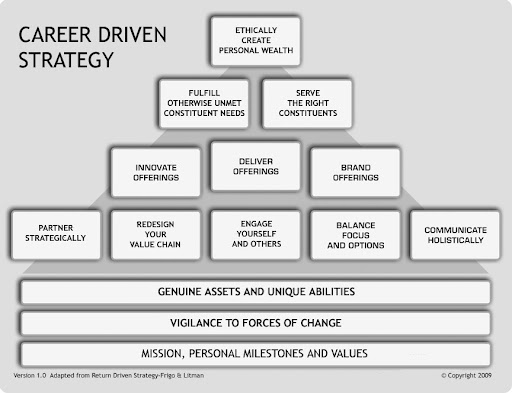This "Page"-turner co-developed the search engine that changed the internet forever. Discover his story here!
| From the desk of Miles Everson: Hi! I hope your week is off to a wonderful start! Today, we’re putting the spotlight on one of our “Marketing Marvels.” Every Monday, we talk about outstanding individuals and highlight the marketing and business insights we can learn from them. For this article, we’ll talk about the other half of the dynamic tech duo that revolutionized how users interacted with the Internet! Continue reading below to learn about the marvelous story of this computer scientist. |
This "Page"-turner co-developed the search engine that changed the internet forever. Discover his story here! In the early days of the Internet, search engines functioned differently than they do today. Back then, results were organized by counting how frequent search terms appeared on the page. This wasn’t wrong, but there was certainly a better way of going about it. … and that’s exactly what a pair of computer scientists set out to prove in 1996 with PageRank, a research project they developed when they were pursuing their doctorate degrees in Stanford University. PageRank would eventually evolve into what we know today as Google, the world’s most dominant and widely used search engine. Eventually, this search business evolved into Alphabet, a multi-trillion dollar tech juggernaut. A few weeks ago, we talked about Sergey Brin , one of the co-founders behind Google. For today’s “Marketing Marvels,” we’re going to talk about the other half of this dynamic tech duo. His name? Larry Page!
Page was born in March 1973 to parents who had a background in computer science. As a result, he was exposed to technology magazines and computers during his formative years, imbibing in him a love for everything that had to do with tech and computers. In 1995, Page received his bachelor’s degree in engineering with a major in computer engineering from the University of Michigan. Three years later, he earned his master of science degree in computer science from Stanford University. Page went on to pursue a doctorate in computer science at Stanford. After enrolling in the program, he considered exploring the mathematical properties of the World Wide Web. After telling his academic advisor about this, he was encouraged to pursue his idea. His fascination with this theme led him to take a deep dive into how web pages were linked to a page. As part of his research, he also studied the role citations played in academic publishing. Page’s life would take a different turn when he met Sergey Brin. Together, they co-authored a research paper and worked on a project that led to the development and creation of the Google search engine. This research project culminated in the creation of PageRank, an algorithm that determined a website’s relevance based on the number of pages and their importance that linked back to the original site. This search engine was originally named “BackRub” because it checked backlinks to determine the importance of a website. Simply put, the search engine ranked web pages based on relevance and authority rather than keyword matching. The creation of this search engine was revolutionary because it addressed a problem for the earlier iterations of the Internet: How users can find reliable, authoritative, and relevant information in a packed digital landscape. Eventually, the pair renamed the search engine they developed to Google.
Fast forward to 2004, Google had established itself in the tech sector through its search engine business and had become a public company through an initial public offering (IPO). Once Google had become large enough through strategic acquisitions like YouTube and releasing services and products like the email service Gmail, ad services provider Google Ads, and the Internet browser Chrome, Page and Brin announced the restructuring of the company under the umbrella of a new parent company called Alphabet in 2015. Brin and Page served as Alphabet’s president and chief executive officer respectively, until handing down the reins to Sundar Pichai in 2019. Today, Alphabet operates a multi-trillion dollar empire that spans not only search engines, but also cloud computing, advertising, artificial intelligence (AI), video streaming, and others. All of this wouldn’t have been possible if it were not for the immense contributions of Page. That said, what are the key takeaways from his success story?
With his track record of success and mindset taken into account, it’s unsurprising to know that Page is a “Marvel” in the world of tech. His pursuit of massive growth and mindset of continuously innovating and creating something new have enabled him to reach the heights few people ever reach. So, if you want to take your professional life to the next level, Page is definitely a “Marvel” you should look up to! You never know, his traits just might be what you need to succeed in today’s highly innovative landscape! Hope you’ve found this week’s topic interesting and helpful. EXCITING NEWS AHEAD The world of work has shifted, and there’s no going back. The barriers to entry have never been lower for talented professionals to work independently, and today’s massive external workforce is hardly a pandemic-produced fad. Business owners can only survive in the new work landscape by partnering with this deep talent pool. With decades of experience in both small-business entrepreneurship and executive management at PwC, I truly believe that the future of work is independent. With that, I’m happy to share with you that my book, co-authored with Walter Scott Lamb, is now available on Amazon! Free Birds Revolution: The Future of Work & The Independent Mind This new bestseller is an essential read for both independent professionals and corporate executives. Here, we provide educational and practical guides to unpack the ever-growing workforce and offer you crucial ways to become a client of choice. Click on the link above to order your copy. Let this bestselling book help you future-proof your career and organization in the new world of work. Stay tuned for next Monday’s Marketing Marvels! Success in Hollywood isn’t just about talent—it’s also about timing, adaptability, and knowing how to connect with an audience. Learn more about Tom Holland and Bero in next week’s article! |

Miles Everson
CEO of MBO Partners and former Global Advisory and Consulting CEO at PwC, Everson has worked with many of the world's largest and most prominent organizations, specializing in executive management. He helps companies balance growth, reduce risk, maximize return, and excel in strategic business priorities.
He is a sought-after public speaker and contributor and has been a case study for success from Harvard Business School.
Everson is a Certified Public Accountant, a member of the American Institute of Certified Public Accountants and Minnesota Society of Certified Public Accountants. He graduated from St. Cloud State University with a B.S. in Accounting.




